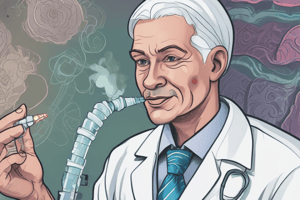Podcast
Questions and Answers
What is a primary focus of respiratory therapy?
What is a primary focus of respiratory therapy?
- Assessment and treatment of respiratory disorders (correct)
- Nutritional counseling for obesity
- Bone health management
- Cardiac rehabilitation
Which of the following is NOT a responsibility of a respiratory therapist?
Which of the following is NOT a responsibility of a respiratory therapist?
- Administering anesthesia (correct)
- Educating patients about respiratory health
- Conducting chest physiotherapy
- Monitoring vital signs and oxygen levels
What condition is commonly treated by respiratory therapists?
What condition is commonly treated by respiratory therapists?
- Gastroesophageal reflux disease (GERD)
- Diabetes
- Hypertension
- Chronic Obstructive Pulmonary Disease (COPD) (correct)
Which equipment is typically used for monitoring oxygen saturation?
Which equipment is typically used for monitoring oxygen saturation?
What is an essential aspect of patient education for respiratory therapists?
What is an essential aspect of patient education for respiratory therapists?
What qualification is typically required for a respiratory therapist?
What qualification is typically required for a respiratory therapist?
Which trend is emerging in the field of respiratory therapy?
Which trend is emerging in the field of respiratory therapy?
What does continuing education for respiratory therapists primarily ensure?
What does continuing education for respiratory therapists primarily ensure?
Flashcards are hidden until you start studying
Study Notes
Overview of Respiratory Therapy
- Respiratory therapy is a specialized area of healthcare focused on the assessment, treatment, and management of patients with respiratory disorders.
- It involves techniques to improve breathing, oxygenation, and overall lung function.
Key Responsibilities
-
Assessment:
- Perform diagnostic tests (e.g., pulmonary function tests).
- Monitor vital signs and oxygen levels.
- Evaluate patients’ respiratory status and history.
-
Treatment:
- Administer aerosolized medications and oxygen therapy.
- Provide mechanical ventilation and non-invasive ventilation support (e.g., CPAP, BiPAP).
- Conduct chest physiotherapy to aid in lung clearance.
-
Management:
- Develop and implement individualized care plans.
- Educate patients and families about respiratory health.
- Collaborate with multidisciplinary teams (doctors, nurses, etc.).
Common Conditions Treated
- Chronic Obstructive Pulmonary Disease (COPD)
- Asthma
- Pneumonia
- Pulmonary fibrosis
- Sleep apnea
- Cystic fibrosis
Equipment Used
- Oxygen delivery systems (cylinders, concentrators).
- Nebulizers and metered-dose inhalers.
- Mechanical ventilators.
- Pulse oximeters for monitoring oxygen saturation.
- Spirometers for lung function testing.
Patient Education
- Importance of medication adherence (e.g., inhalers).
- Techniques for effective breathing exercises (e.g., pursed-lip breathing).
- Smoking cessation programs and resources.
- Recognizing signs of respiratory distress.
Professional Qualifications
- Respiratory therapists usually require an associate’s or bachelor’s degree in respiratory therapy.
- Licensure and certification are typically required, which may include passing the National Board for Respiratory Care (NBRC) exam.
- Continuing education is essential to stay updated on best practices and new technologies.
Emerging Trends
- Telehealth applications for remote monitoring and consultations.
- Use of advanced technologies (e.g., high-flow nasal cannula therapy).
- Focus on patient-centered care and outcomes measurement.
- Increased emphasis on managing complex chronic conditions.
Overview of Respiratory Therapy
- Specialized healthcare area for assessment, treatment, and management of respiratory disorders.
- Techniques are utilized to enhance breathing, oxygenation, and lung function.
Key Responsibilities
-
Assessment:
- Conduct diagnostic tests like pulmonary function assessments.
- Continuously monitor vital signs and oxygen saturation.
- Collect and evaluate patient respiratory history.
-
Treatment:
- Administer aerosolized medications and oxygen therapy as needed.
- Provide mechanical ventilation and non-invasive ventilation support, including CPAP and BiPAP.
- Conduct chest physiotherapy to assist with lung clearance.
-
Management:
- Create and implement personalized care plans for patients.
- Educate patients and families about respiratory health maintenance.
- Work collaboratively with a multidisciplinary healthcare team, including physicians and nurses.
Common Conditions Treated
- Chronic Obstructive Pulmonary Disease (COPD)
- Asthma
- Pneumonia
- Pulmonary fibrosis
- Sleep apnea
- Cystic fibrosis
Equipment Used
- Oxygen delivery systems, including cylinders and concentrators.
- Nebulizers and metered-dose inhalers for medication delivery.
- Mechanical ventilators to assist with patient breathing.
- Pulse oximeters for tracking oxygen saturation levels.
- Spirometers for measuring lung function.
Patient Education
- Emphasize the importance of adhering to prescribed medications, particularly inhalers.
- Teach effective breathing techniques, such as pursed-lip breathing exercises.
- Provide resources and support for smoking cessation.
- Educate patients on recognizing early signs of respiratory distress.
Professional Qualifications
- Typically, respiratory therapists hold an associate’s or bachelor’s degree in respiratory therapy.
- Licensure and certification, often requiring passage of the National Board for Respiratory Care (NBRC) exam, are essential.
- Ongoing education is necessary to keep up with best practices and advancements in technology.
Emerging Trends
- Integration of telehealth for remote patient monitoring and consultations.
- Adoption of advanced technologies, such as high-flow nasal cannula therapy.
- Increased focus on patient-centered care and measuring healthcare outcomes.
- Emphasis on the management of complex chronic respiratory conditions.
Studying That Suits You
Use AI to generate personalized quizzes and flashcards to suit your learning preferences.




